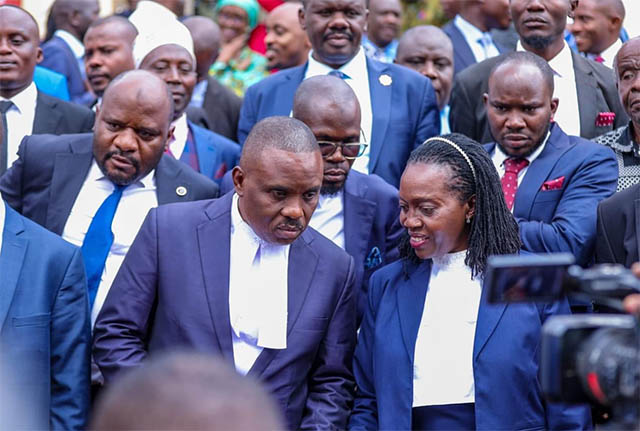Lawyers representing opposition leader Dr. Kizza Besigye have called for a constitutional reference in his ongoing trial before the General Court Martial, challenging the court’s jurisdiction over civilians and its interpretation of constitutional provisions.
Led by Erias Lukwago, the defense team argued that the court is overstepping its authority by adjudicating matters that fall exclusively under the jurisdiction of the Constitutional Court.
“The ruling by the General Court Martial involves matters that require constitutional interpretation to ensure justice,” Lukwago asserted, citing issues related to the right to a fair trial and the jurisdictional limits of military courts.
Ernest Kalibbala, another key member of the defense team, accused the military court of undermining civilian authority. “By asserting jurisdiction over civilians, the General Court Martial is placing itself above civilian authority, in direct violation of Article 208 of the Constitution,” he said. Kalibbala further criticized the charge sheet against Besigye and his co-accused, describing the accusations as vague and noncompliant with Article 28(12), which demands clear definitions of criminal offenses.
The defense also raised concerns about the impartiality of the General Court Martial, arguing that its subordination to the executive compromises its independence. “A military court, being subordinate to the executive, cannot provide the impartiality required under Article 28(1) of the Constitution,” Kalibbala argued, underscoring the court’s vulnerability to external influence.
Fredrick K. Mpanga added weight to the defense’s case by emphasizing the constitutional role of military courts. “Military courts are intended for disciplinary matters within the armed forces.
Extending their jurisdiction to civilians not only undermines constitutional rights but also erodes the rule of law,” Mpanga stated. He also highlighted that members of the military are not exempt from constitutional protections, insisting, “Joining the military does not mean forfeiting fundamental rights and freedoms. The Constitution remains the supreme law.”
The defense team urged the General Court Martial to refer the matter to the Constitutional Court for authoritative interpretation, asserting that the resolution of these constitutional questions is critical for safeguarding civil liberties and upholding the rule of law.
This legal showdown comes amid broader debates about the balance of power between civilian and military jurisdictions, raising important questions about judicial independence and constitutional adherence. The outcome of this case could set a significant precedent for Uganda’s legal framework, potentially redefining the limits of military court authority in civilian matters.

